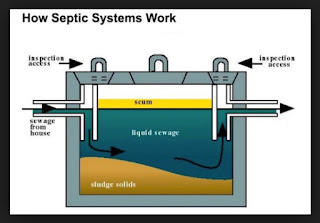MOTHER NATURE and YOUR SEPTIC SYSTEM

Though we have (so far) experienced a relatively mild start to what are considered winter months in Nebraska, I wanted to take the time to talk about weather and how it can effect your septic system. Nebraska is one of those fortunate states that gets to experience all four seasons every year. Our springs are typically cool and wet, summers hot and dry, crisp falls, and cold, snowy winters. During any one of these seasons, we can experience extreme weather. For instance, the fall of 2018 was extremely rainy and led into a winter that has been colder than we have seen for a while. That particular 2018-2019 winter also gleaned quite a bit of snow as well. Why am I taking the time to tell you this? Your septic system is sensitive to what Mother Nature does. If we have a wet fall or spring and the ground is overly saturated, this can cause problems for your system. Typically, it is ...







